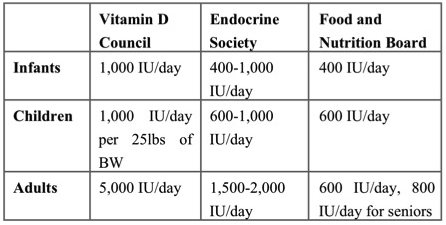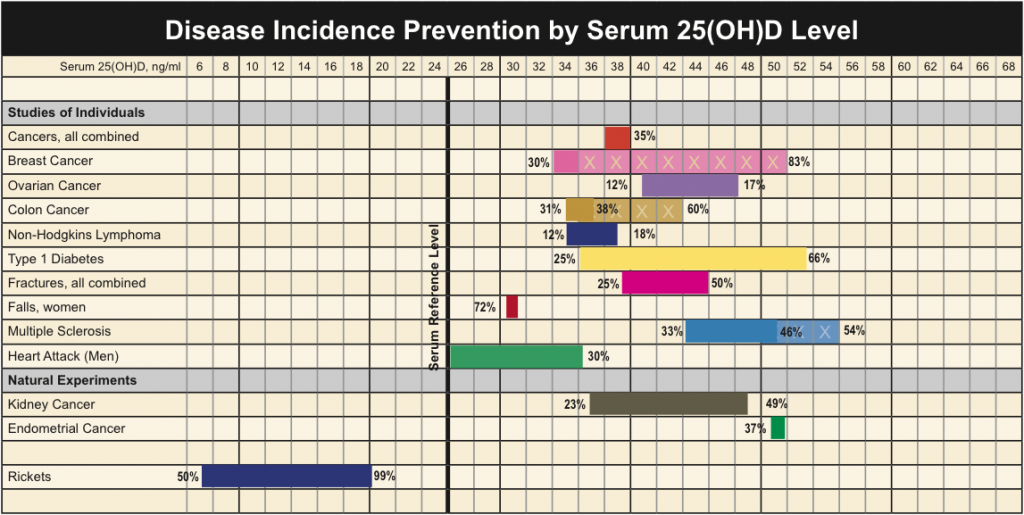Unlike other vitamins (C, B, etc.), vitamin D3 is difficult to obtain from food and depends mainly on the amount of sunshine we get. This, along with a few other factors (including the implementation of the low-fat guidelines), has created a vitamin D deficiency epidemic in North America.
55% of otherwise ‘healthy adults’ and 70% of teenage girls have clinically deficient vitamin d levels.
This becomes even more of an issue, for those with inadequate exposure to regular sunlight, darker or thinner skin (elderly), pregnant women, and obese individuals.

If you stop for a second and think about your typical day, when are you actually outside in the sun?
Probably not between 9am & 5pm.
And what about from November to March?
Even if you are outside, are you getting sunlight, or are you covered up?
Here is a chart of the minimum amounts necessary per day in order to maintain our current vitamin D levels:

I will say it again – these are the dosages necessary to maintain your current blood serum levels.
So what are your levels?
Well, for those in Northern Climates there’s a lot of days we get zero IUs – as we see extremely little sun (if any) in the winter months. This means we’re losing at least the maintenance level on a daily basis. Which, according to the vitamin D council, would equate to 50,000iu’s of need after 10 days of no sun. Keeping in mind of course, that this is to return to the level you started with – that could’ve been deficient to begin with.
Unfortunately, many living in warmer climates are getting equally atrocious intake levels. With TJ – that lives in Arizona and works for Tech Co. XYZ from 8am-6pm – getting just as little sun as Janice from Alaska.
For whatever reason the majority of the population seems to be extremely concerned with the potential for vitamin D toxicity. Even though the evidence is quite clear in demonstrating how rare vitamin D toxicity is, and how detrimental deficiency can be. For instance:
Dosages of 100,000IU’s given every 4 months for 5 years only raised levels to 0.29dL. (Which is still deficient)
The only two men ever ‘poisoned’ took 1,7000,000IUs EVERY DAY for 7 months!
While these are some of the diseases you’re at risk of from deficiency:

In other words, you don’t have to be a rocket scientist to see that deficiency is a much bigger concern than toxicity. So unless you’re a surfing instructor in Hawaii, or a fisherman in the Caribbean, you likely need to supplement vitamin D to avoid deficiency.
As demonstrated above, the recommended daily requirement is between 800 and 5,000iu’s per day (when there’s no sun exposure). Although, as I discuss in Live It NOT Diet!, these daily requirements are established based on “preventing a disease at the lowest possible level.” So, don’t be afraid to aim for the upper threshold…and potentially even surpass it.
Stay Lean!
Coach Mike
RELATED ARTICLES:
Bone Health With Vitamin D NOT Calcium
High Dose Vitamin D is Ineffective? Not So Fast!
Anxiety & Depression - Chemical Imbalance or Dietary Disaster?
5 Servings Per Day or 1 Serving/Month - The Real Nutrient Dense Food


